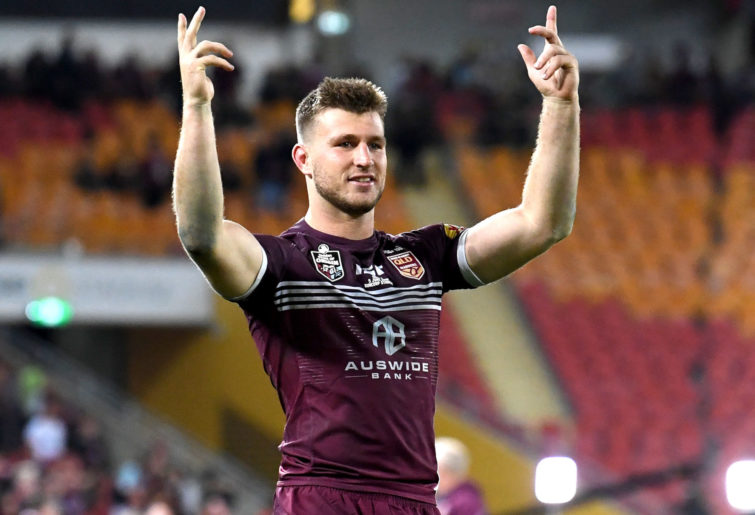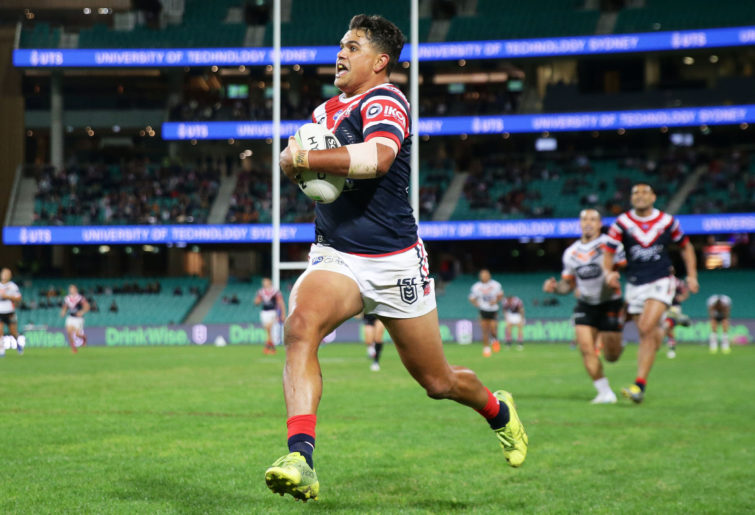The continuing saga surrounding Sydney Roosters Latrell Mitchell’s contract situation raises questions over the NRL’s rules for player movement between clubs.
In particular, the rules allowing players to sign a contract with a rival club prior to when their current contract expires.
Under NRL rules, from 1 November 2019 players such as Mitchell, with still a year to run on their contract, can sign with whichever club they can arrange a deal with for 2021 and beyond.
It begs the question – why does the NRL allow players and coaches who have yet to complete their current contract sign with a rival?
In no other professional sporting competition in the world would it be permitted to have an employee of one club be at the same time signed and sealed with another.
There are good reasons for this and the NRL should follow suit.
It has been for all to see the awkwardness of having someone on a club’s books who has committed their future elsewhere.
Shortly following the 2011 NRL grand final, then premiers Manly learned their coach Des Hasler had signed with Canterbury for the 2013 season.
The Sea Eagles allowed Hasler to forgo his last year with the maroon and whites and depart right away to the Bulldogs in time for 2012.
What choice did Manly have?
How could Manly have allowed Hasler to remain at Brookvale with the conflict of interest it would involve having a coach on their books who at the same time was planning to work for a rival?
In late 2018 South Sydney and Brisbane agreed it was in both club’s interests to allow Wayne Bennett and Anthony Seibold to immediately exchange coaching positions rather than wait a further 12 months when their newly signed contracts were due to commence.
Why would either club want someone coaching their team when they have signalled that soon enough, they will be long gone?
This issue is not restricted to coaches.
It has been reported Jai Arrow is requesting an immediate release from the Gold Coast Titans after agreeing to a four-year deal with the Rabbitohs commencing in 2021.

(Photo by Bradley Kanaris/Getty Images)
This is a request the Titans would never have had to confront if not for Arrow being able to sign on the dotted line with another club before the expiration of his Titans contract.
If the Titans don’t succumb to releasing Arrow for 2020 they run the risk of having a far from motivated player on their roster who may already have one eye on playing for Wayne Bennett and may not be worth keeping around.
Fair or not, once somebody in the ranks commits to terms with another club, his teammates, coaching staff and club management can be forgiven for being sceptical whether the player is fully committed to his current employer who are still paying his salary.
Which brings us to Mitchell, who in recent times has had more media coverage than the Prime Minister – that was at least before reports about a certain holiday to Hawaii.
Within just weeks of the end of last season, the Roosters were all but forced to bring to a head their negotiations with Mitchell and finalise whether he was going to remain a Rooster in 2021 and beyond.
They could not hold off these discussions until 2020 because from 1 November 2019 Mitchell became eligible to be swooped upon by any club for 2021 onwards.
When Mitchell declined a new contract from the Roosters the tricolours had to move on quickly to their other players also entering the last year of their contracts who also were at risk of signing elsewhere for 2021.
These include Joseph Manu, Jared Waerea-Hargreaves and Sio Siua Taukeiaho.
This kind of scenario is one that all clubs face.
All clubs have already progressed, if not finalised, their major recruitment decisions not simply for 2020 but for 2021.
They have no choice.
If a club is spending too long mulling over whether to snatch a high profile player off-contract for 2021 they can be sure another club will beat them to it because the system allows them.
The player transfer system would benefit if the NRL registered contracts signed by current players with rival clubs only after the expiration of the player’s current contract.
Clubs would still be allowed to re-sign their players any time throughout the duration of their contracts.
If clubs were assured competitors could not sign any of their players to an NRL registered contract until after the player’s current contract, there would be less distraction during the season.
Clubs and players would not be hurried into making final decisions about their futures so far in advance.
If the Roosters knew Mitchell could not sign a contract with a rival club until the conclusion of the final year of his contract, they could have held off negotiations until sometime during 2020 and thereby avoided the events of recent weeks which have tested his relations with the club and possibly resulted in him having played his last game for the tricolours.

(Matt King/Getty Images)
Many of the players, however, would have a different take on this issue.
Sydney Roosters co-captain Boyd Cordner was quoted by The Daily Telegraph on 13 December that the current system provides security for the players.
“It is hard because players want security,” he said.
“So if you are going into a year with no deal beyond that and if you get injured, it is going to take a massive hit to your salary.
“I think it is a good thing that the game has done where you can get that security, which is paramount in our game with the physicality that we play with.”
No doubt you can understand why players want the current arrangements to continue.
But is the current system in the best overall interests of the game?
While it is understandable that players seek security, it is an argument that seems to have fallen on deaf ears in other professional sporting competitions throughout the world.
It could be asked, why should a prospective employer have to commit to signing someone so far in advance of their arrival to their club when there is the possibility for the player to get injured or lose form?
Another often-cited argument for allowing the current rules to continue is the need for players to have enough time to find a new home or a school for their children.
In most other professions such arguments are dismissed.
Employees are often required to move at short notice, particularly those with salaries comparable to many professional rugby league players.
Besides, in this professional age, with the ever-growing numbers of support staff found in NRL clubs, do the clubs not have people who can assist players and their families with transitioning between clubs?
Is it really a huge inconvenience for a club to sign a recruit after the previous season has concluded?
Are North Queensland Cowboys complaining Valentine Holmes had not signed with them until after last season’s grand final?
This proposed change to how players move between clubs does not pretend to prevent players or their managers having discussions with any club at any time regardless of how long a player has left on their contract.
Nobody is naïve to think anything could prevent that from ever happening.
The point is, even if during their current contract a player had come to an agreement with a rival club the NRL could refuse to register any such agreement until the expiration of the player’s current contract.
That means all clubs could be certain any player coming off contract in a given year would not be already signed with a rival and could not be until a certain date after the season such as, for example, 1 November.
Clubs would be assured they could still approach an upcoming off-contract player with an offer during a nominated time after the season because they know until that time he could not have signed anything that would be recognised by the NRL.































































































